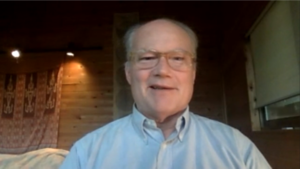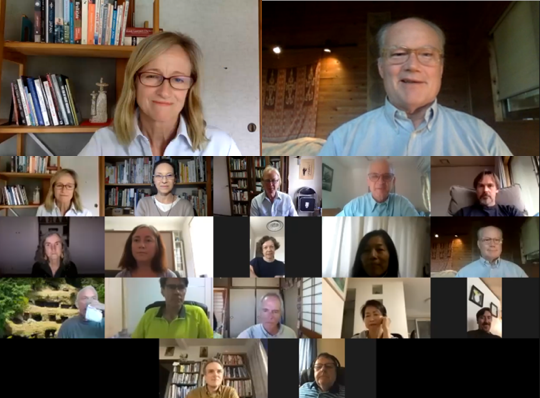
WiK’s first ever Zoom event took place on May 23 at 4.00 pm with 18 participants in all, which was a good number considering the event was limited to WiK members only. Particularly pleasing was that we had participants from Scotland, Australia and Kamakura in addition to a speaker in Tokyo and an interviewer on an island in the Inland Sea. Needless to say, it was the first time for us to have such outreach, and given the inclusive nature of online conferencing we will surely be looking at holding similar events in future, regardless of Corona conditions. WiK too will be adjusting to a new normality.
As for the interview, Jeff covered a variety of topics in fluent and fulsome manner without recourse to notes of any kind. He started with the story of his Counterpoint Column, which he took over from Roger Pulvers and ran for many years before being suddenly dropped following the arrival of new owners at the Japan Times. This took place in the wider context of a campaign by the Abe government to ‘correct’ negative or critical reporting about Japan.

Another topic to loom large was that of apologies for Japan’s role in WW2. It was pointed out that while Japan has often apologised, this has been undermined by subsequent statements that served to devalue or negate them. Whereas social democrat PM Murayama spoke of ‘mistaken national policy’, the present PM Abe Shinzo sought to justify the sacrifice made by the wartime generation in enabling today’s Japan. In fact 80% of Abe’s cabinet belongs to the nationalistic Nippon Kaigi, one of whose aims is to revision WW2 as Japan’s liberation of Asia. (Emperor Akihito by contrast made a point of praising the postwar generation for the present prosperity.) School textbooks are an indicator of the change in official thinking, with the omission of such controversial issues as the comfort women (there remains just one approved textbook that mentions them, and the publisher has been subject to threats and harassment).

Another major topic was Article 9, which has been a sticking point for Abe, as one of his key aims is to amend the constitution and allow Japan to use its military power for more than self-defence. To get through such a constitutional amendment requires two thirds majority in the elective bodies plus a a referendum after that, and with the Komeito party, a government ally, not supporting him and the general public not in favour, Abe’s dream is seemingly unattainable. However, he effectively achieved his aim in 2015 by pushing through the US-Japan Security Treaty which asserts collective self-defense and which has effectively torpedoed Article 9 by obliging Japan to aid the US if need be.
Questions followed, amongst which was one about the lack of opposition to Abe, and one about his support for the nuclear industry. The former was partly ascribed to rural seats being given undue weight, which serve to boost the LDP. At the same time Abe could be said to be lucky in serving at a time when there is no strong rival. As for the nuclear industry, it was pointed out that there are many powerful vested interests and that promotion of Japan’s nuclear expertise has strong export potential. As with the other topics, the questions were dealt with by Jeff in a manner that showed he was well-informed and had a clear overview of developments. Though Zoom did not allow us to appreciate his physical presence, I think those who participated would agree that he came over very well online and on camera. This first step has set a good precedent for how WiK can overcome the Corona threat and benefit in the new normality to follow.

For those who would like to read the background to the termination of Jeff’s column for The Japan Times, please click here.
Jeff Kingston is the director of Asian Studies, Temple University Japan. He became well-known through his column for the Japan Times, in which he commented on politics and current affairs. His final column about the power accrued by Shinzo Abe was on Sept 23, 2017. He holds a PhD in history from Columbia University, and he writes for a large number of media outlets. Amongst his books is Press Freedom in Contemporary Japan (2017), and his most recent work Japan, published by Routledge, has won favourable reviews worldwide (see this one by Damian Flanagan). He is also the editor of Critical Issues in Contemporary Japan, published in 2019.






Recent Comments